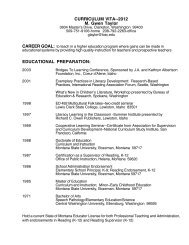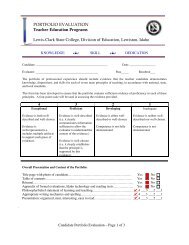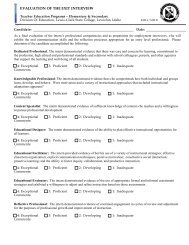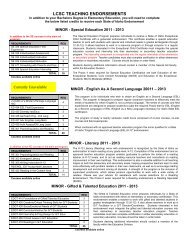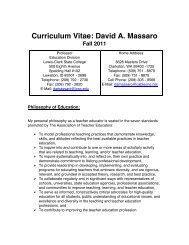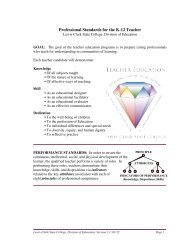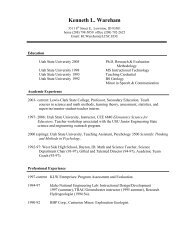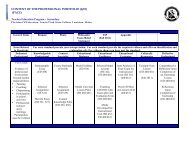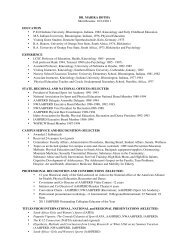PACE - LCSC Education Division - Lewis-Clark State College
PACE - LCSC Education Division - Lewis-Clark State College
PACE - LCSC Education Division - Lewis-Clark State College
You also want an ePaper? Increase the reach of your titles
YUMPU automatically turns print PDFs into web optimized ePapers that Google loves.
On-Site Teacher Educators: The School MentorsModel and MentorOn-site teacher educators, OSTE, interns, and college supervisors work as a team over the courseof the internship. On-site teacher educators play an important and invaluable role in helpingtheir interns to begin the transition toward becoming professionals. These teachers allow theinterns to slowly gain teaching experience that will enable the intern to take major responsibilityfor instruction during extended periods in their second internship. Potential on-site teachereducators have opportunities to interview the interns before making a commitment to work withthem. As a result, an OSTE may accept or decline to work with an intern without being asked toprovide a cause or explanation. This permits applicants for internships to be consideredindividually and compatibility factors are allowed to influence placement.The on-site teacher educator, OSTE, is both model and mentor to the intern. As a model, theexperienced teacher displays those teaching behaviors that demonstrate to the intern effectiveways of interacting with pupils. As a mentor, the OSTE will take personal responsibility for theintern’s success, acting as guide, facilitator, and encourager through the internship experience.On-site teacher educators influence the teaching confidence of the interns they supervise, andgaining confidence is a prerequisite for a successful internship experience, according toCruickshank and Kennedy (1977).A broad definition of the on-site teacher educator’s job, suggested by Copas (1984) states, “Thejob of (the on-site teacher educator) is to help the intern develop a deep and meaningful conceptof teaching, to help the intern analyze the many facets of teaching, to provide the intern withsources and resources, and to encourage the intern’s unique teaching behavior.”SelectionQualified, capable teachers, who wish to assume the responsibilities of guiding an intern, areselected based on recommendations from administrators, peers, and college <strong>Education</strong> <strong>Division</strong>faculty. On-site teacher educators meet the following selection criteria.They have at least three years of successful teaching experience, are up-to-date in theirteaching field, and are committed to career-long professional development.They are recognized as teachers who demonstrate “best practices” and can serve as rolemodels for dealing with both content and students.They are interested in working with an individual intern and with the college’s <strong>PACE</strong>Elementary Teacher <strong>Education</strong> Program and see it as another arena for teaching.They have the interpersonal skills to communicate effectively with interns and collegesupervisors in offering evaluation and support.24



